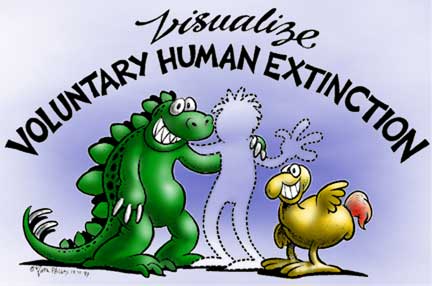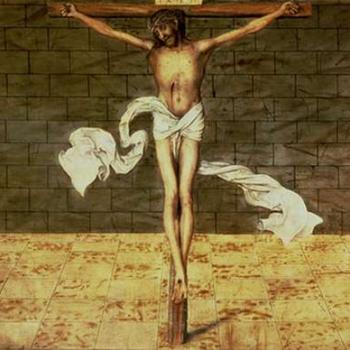Advent is about Christ’s second coming as well as His first, a time to reflect on what the Bible says about the end times. Jesus gives a number of signs that signify that the end is near. We blogged about “Wars and Rumors of War,” a sign that keeps re-occuring, reminding us that the end is always near.
Today I want to consider a sign that is more unusual, a baffling phenomenon that has emerged quite recently: that people will consider barrenness–or by extension, not having children–to be a blessing.
As Jesus is being led away to Golgotha for His crucifixion, this happens:
And as they led him away, they seized one Simon of Cyrene, who was coming in from the country, and laid on him the cross, to carry it behind Jesus. And there followed him a great multitude of the people and of women who were mourning and lamenting for him. But turning to them Jesus said, “Daughters of Jerusalem, do not weep for me, but weep for yourselves and for your children. For behold, the days are coming when they will say, ‘Blessed are the barren and the wombs that never bore and the breasts that never nursed!’ Then they will begin to say to the mountains, ‘Fall on us,’ and to the hills, ‘Cover us.’ For if they do these things when the wood is green, what will happen when it is dry?” (Luke 23:26-31)
I know this is generally interpreted, including by the Lutheran Study Bible, as a prediction of the impending destruction of Jerusalem by the Romans in 70 A.D., the point being that women will wish they didn’t have children to encumber them while fleeing for their lives. That may be, but the fall of Jerusalem is itself a foretaste of the last days, and the bit about asking the mountains to “fall on us” connects to the Sixth Seal and the “wrath of the Lamb” described in the book of Revelations (6:16-17).
Here Jesus is not condemning these women, who are on His side, weeping for His suffering. He is saying they should weep for themselves and their descendants. What is coming is just sad. And He doesn’t say the barren are blessed, but that “they,” their children, “will say” that the barren are blessed.
That anyone would think not having children is a good thing is a strange prediction. Certainly, in the ancient world of the Bible, having children was considered a blessing (Psalm 127:3-5), and barrenness was seen as a lamentable condition (as with Sarai, Rebekah, Rachel, Hannah, Samson’s mother, and Elizabeth, though God answered their prayers by giving them a child). Not that being a parent is necessary or that every woman is called to this vocation, as St. Paul makes clear (1 Corinthians 7). But the consecrated virgins of the early church or the nuns of Catholicism with their vows of celibacy would never say that barrenness is a blessing, as such. Nor would we be likely to hear this from women or men in previous centuries.
But today we hear it all the time. Not from everyone, of course. Today, 1 in 6 couples have fertility problems, and many of them would do nearly anything to have a child. But among American adults under 50, nearly half, 47%, do not plan on having a child.
The exaltation of barrenness permeates our culture. Our technology has separated sex from procreation, so we have even made sex barren, as in our embrace of homosexuality and pornography. And when the womb is not barren, but conceives a child, we have recourse to abortion. And many people, including much of the medical profession, advocate the sterilization of children if they say they want to change their gender.
Men too want to take away their ability to conceive children. At the Democratic National Convention, mobile clinics offered both free abortions and free vasectomies. Now that Trump was elected, according to Newsweek, many women are lining up to get sterilized.
The desire to have children is not just a religious feeling. Even materialists, even atheists have always recognized the biological imperative of reproduction. It is ironic that “progressives” today seem especially in favor of not having children because the philosophy of “progressivism,” that humanity is evolving to ever higher levels of goodness, owes much to Darwin, who taught that evolution happens when natural selection causes the best-adapted organisms to have more offspring. Reproduction is the goal of survival.
Today we have “anti-natalists,” who believe it is unethical for anyone to have children. After all, life entails suffering, and it’s cruel to bring a child into the world knowing that he or she is going to suffer. We have gone from the heroic struggle to survive to not wanting to survive because it takes a struggle. Some environmentalists are saying that the human race, to save the planet, should go extinct.
To say “blessed are the barren” is to give up. It is an expression of despair, of nihilism. Behind it is a death wish. “Then they will begin to say to the mountains, ‘Fall on us,’ and to the hills, ‘Cover us.’”
Come, Lord Jesus. Come quickly.
Illustration: Vision in cartoon form by Nina Paley in collaboration with Les U. Knight. Cartoon colorized by Aaron Hackmann., CC BY-SA 3.0 <https://creativecommons.org/licenses/by-sa/3.0>, via Wikimedia Commons














